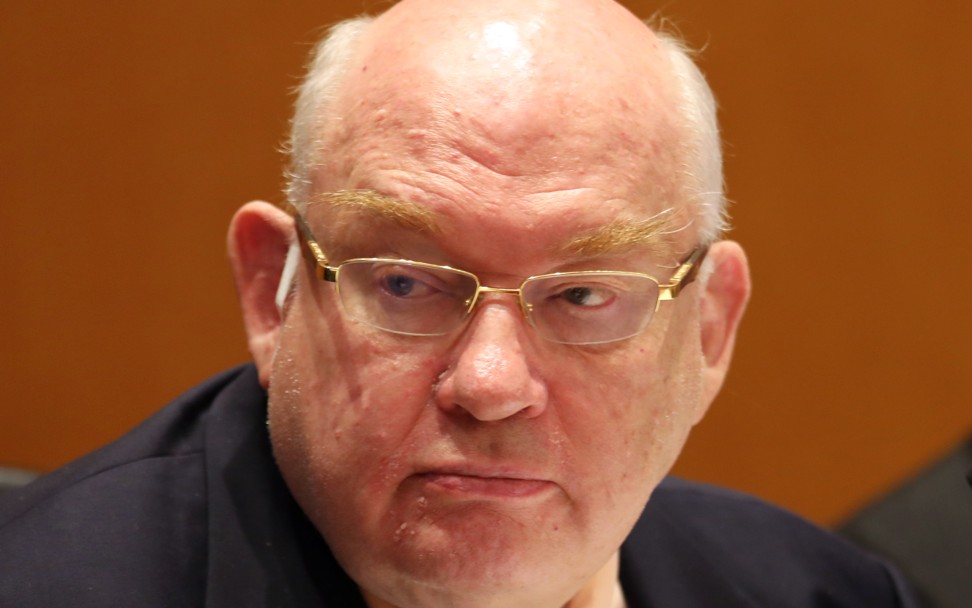
Hong Kong courts have power to decide on constitutional matters, but Chinese national legislature has the final say, former judge says
- Henry Litton was commenting on Beijing’s challenge to a local court ruling that found an anti-mask law and the use of emergency laws unconstitutional
- But Philip Dykes, chairman of the Bar Association, says old ordinances should be re-examined to plug the new constitutional order
Hong Kong courts still have the power to decide on constitutional matters like they did over the past 22 years, but the Chinese national legislature will have the final say, a former judge said.
Henry Litton was commenting on Beijing’s challenge to a local court ruling that found an anti-mask law and the use of emergency laws unconstitutional. Mainland officials have argued “only” the National People’s Congress Standing Committee (NPCSC) has the power to decide on issues of constitutionality.
But the retired Court of Final Appeal judge said he was surprised by the High Court’s ruling on Monday, saying the Emergency Regulations Ordinance was already in place since 1922 before the current administration invoked it to ban the use of face masks.
Zang Tiewei, spokesman for the Legislative Affairs Commission of the NPCSC, said on Tuesday that the power to declare a local law incompatible with the Basic Law, or the city’s mini-constitution, rested on no other authority but the NPCSC. The view was strongly doubted by local lawyers, with former chief justice Andrew Li Kwok-nang saying it would be “surprising and alarming” if it was true.

Litton said he believed Zang’s statement had left out the word “ultimate power” when describing constitutional interpretation. But he said Beijing was only using an emphatic way to make a statement without a change to the legal position.
“I don’t think Beijing is Washington, where policy seems to flip-flop,” Litton said.
“Although I perfectly understand those who construe and interpret the statement literally … but it’s a shot across the bow. Just a reminder to Hong Kong citizens that the ultimate power of interpreting the Basic Law always rests with the NPCSC, it’s always embedded with Basic Law Article 159, which has never changed, and I think it’s unlikely to change.”
Court suspends ruling that Hong Kong mask ban is unconstitutional
He was referring to the Basic Law provision that Hong Kong courts were allowed to interpret the city’s mini-constitution, whether in political or civil disputes, so long as it fell within the area of the high degree of autonomy.
Philip Dykes, chairman of the Bar Association, however, said Litton was “charitable” to think Beijing just missed out the word “ultimate power” when describing on constitutional interpretation.
“If that’s the case, one would expect the mainland authorities to come back and say, ‘Oh no, we didn’t mean that’,” Dykes said.
He added the emergency laws were already dated back to almost 100 years, but under a different situation and constitutional system. “Old ordinances should have been re-examined to plug the new constitutional order,” he said.

Ronny Tong Ka-wah, an adviser to Chief Executive Carrie Lam Cheng Yuet-ngor, believed Zang was in fact referring to Beijing’s ultimate say on Basic Law interpretation, since a statement from the China’s liaison office in Hong Kong later also referred to the NPCSC’s ultimate power of interpretation.
Beijing claim on ‘unconstitutional’ ruling could spell end of ‘one country, two systems’
Tong agreed that as a matter of practicality, judges cannot shy away from ruling on constitutional matters.
“I guess the misunderstanding stemmed from the part of judgment that the NPCSC ran through Emergency Regulations Ordinance before the handover, but the court did not deal with it, so the NPCSC may feel offended,” he said.
Both Tong and Dykes urged Beijing to clarify the earlier statement.

Litton, who retired in 2000 and is often regarded as a conservative judge who placed emphasis on the discipline of law, said judges and lawyers involved in the mask ban case created their own problems by engaging in a constitutional debate, when the subject matter was entirely about Hong Kong statutes.
“The broad power encapsulated in the ordinance has to be very wide for obvious reasons, you can’t anticipate what may be the emergency that may arise,” Litton said in a media interview, adding he has yet to read the full judgment. “Every government will have laws for emergency.”
“No one will disagree that the situation in October was not an emergency,” he said.
He also reiterated his opposition to the protesters’ request for a judge-led inquiry into alleged police violence, saying the ongoing unrest which started in early June had made it impossible for such an inquiry to focus on just one aspect.

